It is not so easy to maintain a large fruit orchard. When a large mango tree grows from the seed that you have thrown in the yard last summer, it fights with the adverse environmental condition itself and provides fruits. But this is not sufficient when you have to meet the demand of the large scale population.
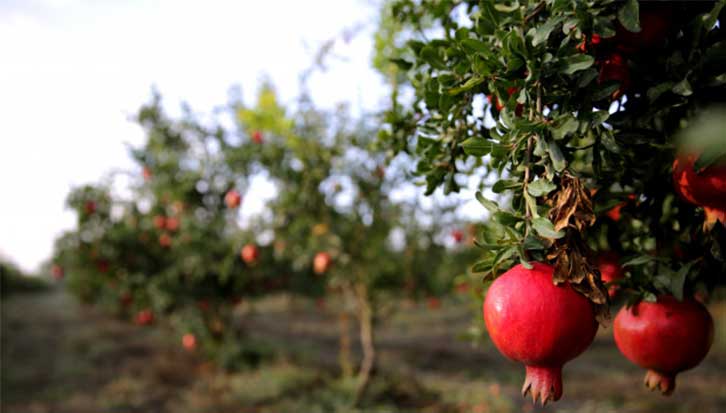
Commercial production requires proper care, better nourishment using the best fertilizer for fruit trees, and a perfect budget-friendly plan.
In my three years short yet meaningful career of working as an agricultural officer, the most common complaints that I had faced from the local farmers that their yield has reduced, leaves started falling off prematurely, and many others. Then the question appears why these problems are occurring? Well, it is because of low soil fertility. The easiest solution is to use a fertilizer that contains both macro minerals and micro minerals. Why should we use fertilizer?
- Fertilizers help to replenish soil nutrients after their depletion to ensure optimum plant growth.
- Proper use of fertilizer can increase the production rate by three folds to meet the demand of the growing population.
- It helps to improve soil quality for farming.
- Micronutrient fertilizers are vital to support human health.
When Can you Fertilize Your Fruit Trees?
According to agricultural researchers and field experts, the growing season is the best time to fertilize your fruit trees. Start it early in the spring and end it in June- July. Late fertilization promotes winter injury when the product should be halt. Morning is the perfect time to fertilize the seasonal fruit trees as the temperature is few degrees Celsius less in the morning than in other times of the day. Thus grass fertilizer and plants can scape leaves burn.
Besides, saying the perfect time to fertilize your fruit trees I would like to alert you to keep away from overusing them. Overfertilization might cease production reducing soil quality.
What is the Best Fertilizer for Fruit Trees?
Some of the mentionable fertilizers for optimum growth and production are mentioned with proper consideration.
1. Best Growth Rate: Jobe’s Organic Fruit & Citrus Fertilizer
“Replenishes lost nutrients in the soil and promotes cellular growth by ensuring micronutrients for plants”
2. Best for Production Rate: Dr. Earth Organic Fruit Tree Fertilizer
“Provides sufficient nitrogen, phosphorus, and potassium for the plant growth and high yield.”
3. Best for Maintaining Biological Balance: Miracle Gro Fruit & Citrus Plant Food Spikes
“More beneficial than chemical fertilizer to reduce soil toxicity.”
4. Best for NPK Ratio: Jobe’s Organic Fruit & Citrus Fertilizer Spikes
“High NPK ratio replenishes nutrient depletion and prevents early falling of fruits and leaves.”
5. Best for Specialized Formulation for Citrus Fruit Trees: Espoma Citrus Tone Plant Food
“Assists in increasing the size of the citrus fruit and its root growth.”
Best Fertilizer for Fruit Trees Reviews
If you are searching for the perfect fertilizer for your fruit trees, I have some excellent suggestions that might come in handy.
1. Jobe’s Organic Fruit & Citrus Fertilizer – Best Growth Rate
The first premium quality fertilizer that made to our list is Jobe’s organic fruit & citrus fertilizer. It is an organic granular fertilizer that is highly recommended for almost all types of fruits bearing trees like apple, avocado, and plum and mainly for citrus fruits like lemon-lime, nuts.
The NPK ratio in this granular fertilizer is 3-5-5 which is essential for fast-acting on the existing trees and for multiplying the growth of the new trees. It has essential Biozome to break down the soil material faster and promoting soil condition and in increasing the disease-resistant ability of the plant.
In a sense, it gives willpower to the plant to fight drought. Jobe’s fertilizer is OMRI listed by the USDA. So it can be assured that it has no synthetic chemicals that reduce soil fertility and in cases increases toxicity.
The main ingredients of the fertilizer are protein hydrolases from feather meal, bone meal, sulfate from potash, manure from poultry, both end mycorrhizae and ectomycorrhizal, and archaea. 1.5 to 16 pounds bag fertilizer is sufficient enough to fertilizer plants every two or three months for a year.
- Organic granular fertilizer without any synthetic chemical
- Optimum NPK ratio for promoting growth
- Increases resistance to plant diseases and harmful insects
- Promotes plant growth
- Facilitates absorption of both macro minerals and micro minerals by the plant
- Jobe’s Biozome helps to increase root mass
- Safe to use around children and pet animals
- Some users complained about the growth of fungus and worms after the use of the fertilizer
- It has a bit of a fishy smell
2. Dr. Earth Organic Fruit Tree Fertilizer – Best for Production Rate
The first product in our list comes in a granular form. To sow a variety and high-quality product, we included DR. Earth organic fruit tree fertilizer. This fertilizer is like a loose, coarse powder that is made of only organic and natural ingredients. So, it is highly suitable for organic gardeners.
This fertilizer is pathogen-free and chicken manure-free. It has seven strains of soil microbes along with ectomycorrhizal and endo mycorrhizae. Respiratory gas released from these microbes promotes the nitrogen content of the soil and also causes root development creating a symbiotic relationship.
Each of the 4 lb. sized pack can be applied dry around the field and then incorporate it with soil the help of a spade. This OMRI-listed fertilizer also works best for hydroponic plants.
- Nourishes the soil for several months after a single application
- Increases drought tolerance
- Ensures healthy root development
- Prevents growth spikes
- Promotes plant performances ensuring the quick release of the nutrients
- Fortified with 5.3% calcium
- Not highly recommended for already plants trees as they must be incorporated with the soil
- Awful smell gathers small fliers, fires ants that damage germinating roots
3. Miracle Gro Fruit & Citrus Plant Food Spikes – Best for Maintaining Biological Balance
Just like the name suggests, this fertilizer sure just a fantabulous job increasing soil condition and promoting plant growth. Miracle-Gro works best on citrus fruits and palm fruit trees.
It has a high NPK ratio of 15-5-10. So along with replenishing the lost nitrogen, potassium, and phosphorous content in the soil, it acts as extra storage of the nutrients in need. Small shrubs and trees undergo a lush and evergreen beautiful foliage.
It is wise to use the fertilizer near the growing season once a year. Before applying the fertilizer moisture the land using water. As the product comes in the form of a spike, implant the spike about 2 feet away from the center of the tree. Keep in mind that each of the spikes should be at least 3 feet apart to prevent over-fertilization of that area.
- Ecofriendly organic fertilizer
- Releases nutrients directly to the root areas
- Promotes production rate
- Increases the size of the fruit
- Adds to the budget
- High NPK ratio along with premium formulation
- Maintain consistency in plant growth
- The Spike system made it more convenient to fertilize the plants
- Some users complained that the product broke during installation
- Sometimes causes leaves and blossom drop
4. Jobe’s Organic Fruit & Citrus Fertilizer Spikes – Best for NPK Ratio
I have already included a product from Jobe earlier. Both of the products are eco-friendly, OMRI-listed organic fertilizer. The only difference is that this product comes in spike form. In urban areas, pot plantations are in vogue. You can easily use six spikes in a thirty-inch pot leaving the edges.
A new addition to this fertilizer is its renewable and biodegradable feature. It nourishes the soil and plants without surface fertilizer runoff. Bacterial, mycorrhizal fungi content is in just the right ratio to promote growth even in unfavorable conditions.
The NPK ratio is 3-5-5 and can be used every 4-6 weeks. It is premeasured to avoid excess use of the fertilizer. So why not give it a try to ensure a healthy and sound ecosystem for your family.
- Highly recommended for container-grown trees like avocado, peach, all nuts, and pear
- Spike ensures continuous release of the nutrients
- Use of the fertilizer results in a bushy green plant
- Increases the blossoms
- Easy to use
- Purely organic and OMRI listed
- Devoid of manure
- Comparatively low NPK
- Not pet-friendly
5. Espoma Citrus Tone Plant Food – Best for Specialized Formulation
The last product that has been made into the list with its smart feature is Espoma citrus-tone plant food. This organic fertilizer is specially formulated to nourish the citrus fruit-bearing plants.
This natural fertilizer is devoid of manures and sludge. It is rich in nitrogen, potassium, phosphorus, zinc, and magnesium. The NPK ratio is quite mentionable which is roughly 5-2-6. So it is also quite suitable for berries. The utility of the fertilizer has been increased to many folds by the addition of beneficial microbes.
For the best result, farmers are often suggested to use the fertilizer at least three times a year. Late winter, spring, and fall is the perfect time to use it on the citrus plants. Its application is also easy and requires less time to fertilize a large garden. But I would suggest you avoid using the fertilizer for potted plants inside the house for their smell.
- Ensures complete and balanced feeding throughout the season
- Produces abundant and favorable fruits
- Suitable for citrus, nuts, and avocado trees
- The slow-releasing process prevents over-fertilization
- Facilitates branching of the trees
- Contains a small amount of arsenic
- After the application of the fertilizers, plants are covered with mites
How to fertilize fruit trees properly?
Fertilizing fruit trees is not as easy as it sounds. You must keep in consideration the time you are using fruit tree fertilizer, quantity, and nature of the plant food. Consider the following steps to fertilize the fruit trees.
Period
It is more suitable to use the fruit tree fertilizer in the growing season just before the bud breaks. From early spring to late July is the perfect time for nourishing the soil with plant food.
Frequency of fertilization
Different types of organic fruit tree fertilizers are available in the market. Some of them are recommended to use at least thrice in a year and some work well out the whole year after one application.
Quantity of the fertilizer
Fertilizers are used to replenish the lost nutrients of the soil. But excess use might result in over-fertilization and result in the shedding of leaves and fruits prematurely. So, fruit tree food should be used according to the demand of the plants and soil.
Selection of fertilizer
Organic and inorganic fruit tree fertilizers are available at variable prices. Some of them are meant only for citrus fruit trees and some all for all plants. So, select the plant food depending on the types of farming and nature of the fruit plant.
Method of application
Some methods of application of fertilizer are mentioned below.
- Spread the fertilizer on the field evenly.
- Spread the fertilizer near the root zone and incorporate it with soil.
- Wet the spoil and implant the spike type of fertilizer one within 2 inches of the center of circumference around the drip line.
- Dig a hole on the ground and apply the fertilizer.
Can you mix different types of fertilizers for fruit trees?
You can fortify fertilizer by mixing different types of fertilizer in a pot. Both of the fertilizers must be spread in a similar form like being spread or sprayed.
The mixing ratio that benefits the most is 3-1-1. A friendly reminder- avoid mixing fertilizers containing ammonium and superphosphates with lime-containing fertilizer.
How much fertilizer do fruit trees need?
If the production rate is below the desired rate then use 1/10 pound of nitrogen per year. An application amount of 10-10-10 NPK during the growing season yields the maximum product.
Can you fertilize a fruit tree too often?
Overfertilization inhibits growth and blooming. So, fertilizing 2-3 times a year depending on the nature of the fruit tree is enough.
Buying Guide – What to look for in choosing the best fruit tree fertilizer?
If any of you search deeper in different websites you will find a variable number of fertilizers with different contain profile and function. So then the question comes- how to select the best fertilizers for the growing fruit trees when there are so many options?
To assist you in this case, I have compiled some points that must be strictly followed to get the best fertilizer for your fruit plant.
Nutrient profile
Nutritional demand is different in a different age of human being. The same goes for the plants. Growing fruit trees require more nitrogen whereas full-grown trees require many other macro and mic minerals along with nitrogen.
Fertilizers with a high NPK ratio are beneficial for the soil. Phosphorous boosts bloom formation. Microorganisms in the fertilizer help to break down the materials of the soil and facilitates soil fertility, increase disease and insect resistance power.
Type of the fertilizer
Nowadays fertilizers are available in granular, loose, and coarse powder and spike form. Spike fertilizers are more prone to damage during shipping and require excess digging. So, select the fertilizer that you might feel at ease to work with.
Nature of the fruit tree
All fertilizers are not meant for all types of trees. For example- citrus fruits grow best when fertilizers fortified with calcium are used in the soil. Growing plants require more nitrogen that is a fertilizer with a high NPK ratio.
The efficiency of the fertilizer
Fertilizers are widely used to restore the lost nutrients of the soil and also to nourish the plants. Monitor the result of the growth and development of the plants after the use of fertilizer this year and analyze the statics of efficiency before buying the same fertilizer for the next seasonal harvest.
Prices
Generally, fertilizers are not that costly. But still, you can search for the same product on different commercial websites and might the one you can afford.
Shipping quantity
Fertilizers are available in different quantities. Starting from 2-3 pounds to 16 pounds. Select the product according to your need.
Check the review
It one of the most important steps before buying a product. Check the review of the product on different commercial websites or the original page of the product. People shares both positive and negative sides of the products on those websites after their use.
Type of fertilizer do fruit trees need
Both synthetic fertilizers and organic fertilizers are used to fertilize the soil for fruit trees.
Synthetic fruit tree fertilizers
Synthetic fertilizers contain potassium, nitrogen, phosphorus, and some synthetic chemical substances. They facilitated plant growth but excess use of these fertilizers causes deposition of minerals on the soil surface with might be fatal.
Organic fruit tree fertilizers
Organic fruit tree fertilizers are natural, renewable, and biodegradable. They might not work as fast as synthetic fertilizers but ideal for organic and heavy metal-free production.
Based on the form of fertilizers, you can use liquid or solid fertilizers.
Liquid fertilizers
Liquid fertilizers are directly applied to the soil and are easily absorbed by the roots of the trees. Synthetic fertilizers are usually liquid.
Solid fertilizers
They are mainly found in granular or powders forms. Organic fertilizers are usually found in solid forms. But many of the synthetic fertilizers are also available in granular forms. These fertilizers are spread in the friend directly or by moistening the soil first.
To sum up
Fertilizing fruit trees is important starting from the level of a family garden to a large-scale garden. It strengthens the core of the plant, nourishes them, increases soil fertility and harvest rate.
According to the editor’s choice, Jobe’s organics fruit & citrus fertilizer is the best among all the best fertilizer for fruit trees mentioned above. Its versatility in use and beneficial effects made a drastic change in mass production.
We would like to know your experience with these organic fertilizers. Let us know your thoughts in the comments section or through email.

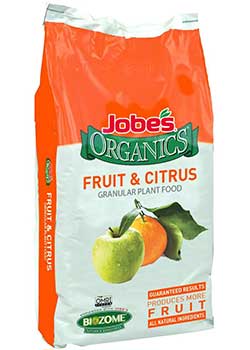
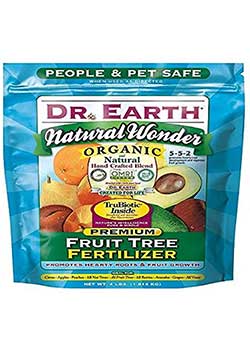
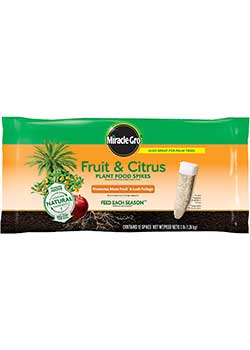
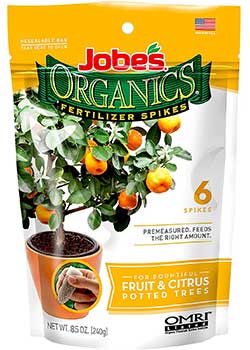
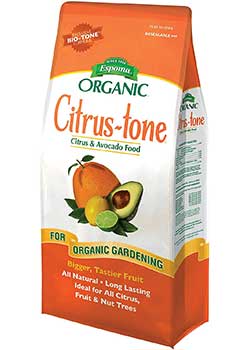
What is a good fertilizer for pomagrams
You can use ammonium sulfate, a high-nitrogen fertilizer for pomagrams.